The Last Thing We Need Is Another War on Terror
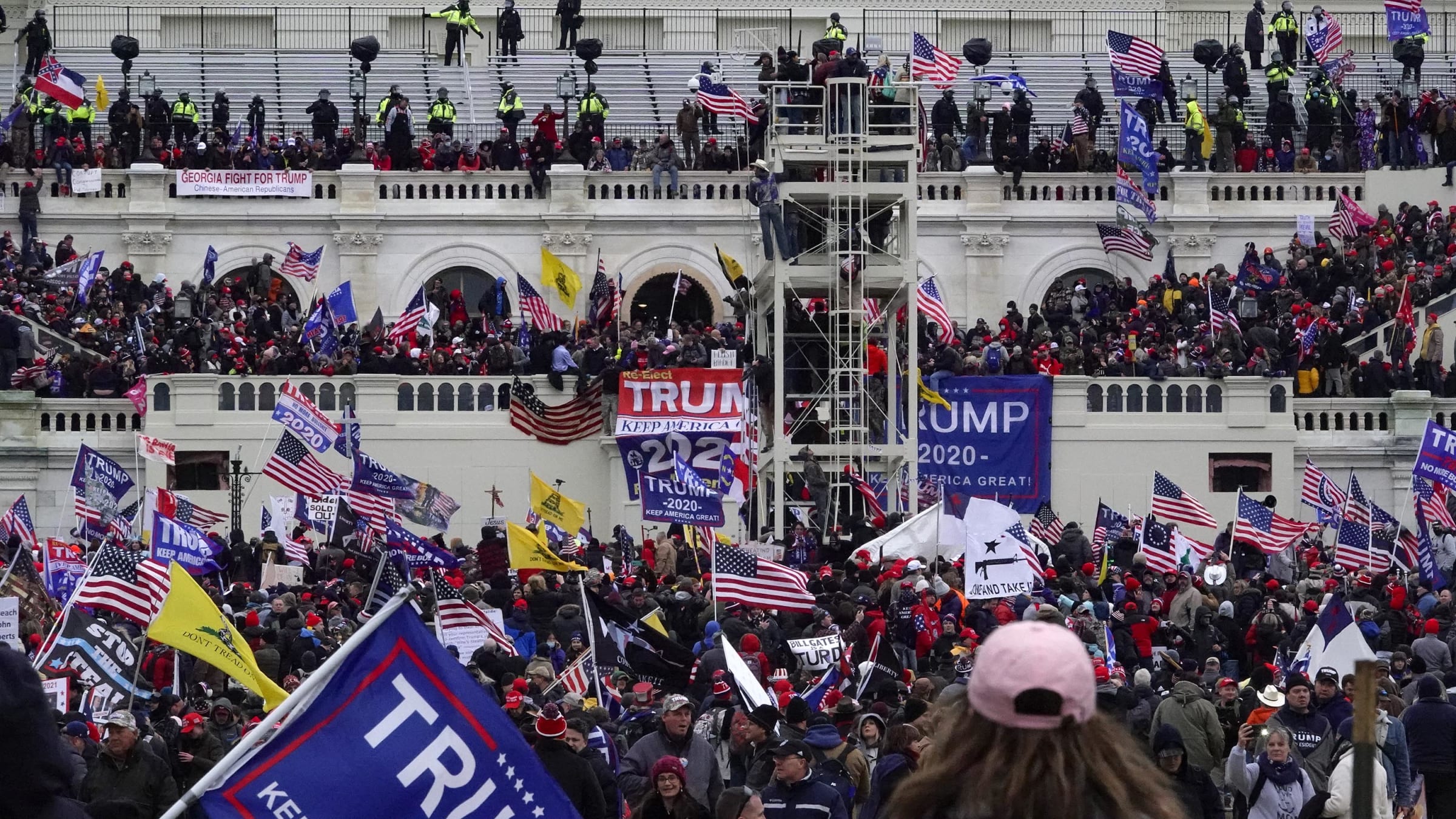
Bonnie Jo Mount/The Washington Post via Getty
The U.S. government does not need new domestic terrorism laws to stop white insurrectionists. It needs the will to confront a violent and deeply American legacy on the march.
Before separating from the Army in 1991, Timothy McVeigh used to wear a T-shirt he got as part of a trial membership in the Ku Klux Klan. In his Army barracks, in full view of Black soldiers, McVeigh advertised his adherence to WHITE POWER. In his spare time, McVeigh frequented gun shows, where, in addition to amassing and selling weapons, he hawked copies of the seminal white terror-manifesto novel The Turner Diaries. The Army had regulations in place to ban “active participation” in terrorist groups like the KKK—its prohibitions on disorganized extremist activity were murkier—it just didn’t enforce them. On April 19, 1995, it became too late to stop McVeigh, a decorated Gulf War veteran, from murdering 168 people, including 19 children, in the bloodiest act of terrorism on U.S. soil before 9/11.
The reckoning that occurred after Oklahoma City is instructive. Congress passed a major piece of counterterrorism legislation the following year, one that anticipated the 2001 PATRIOT Act. It expanded the powers of the FBI and federal prosecutors to surveil, investigate, and charge the terrorist infrastructure in the United States, especially the financial and other “material support” from sympathizers that fueled it. Only the 1996 Antiterrorism and Effective Death Penalty Act granted those authorities to go after not white American terrorists like McVeigh but “international terrorists”—meaning, in practice, Muslim organizations and their supporters. The absurd but deadly serious deflection, pushed by Republicans nervous about a crackdown on their supporters and acquiesced to by Bill Clinton, was a statement about whose terrorism matters, and whose is too politically powerful to challenge.
White terrorism—or, if you prefer, Radical White Terror—is the oldest and most fundamentally American terrorism there is. Distinct among forms of political violence, it feeds from the same innocence narratives of the American Founding on display in textbooks and airport bookstores across the country. There is a reason why its practitioners call themselves patriots and adopt the iconography of the Founding generation. There is a memorial in Alabama to the lives and the freedom that Radical White Terror kept stealing long after the abolition of slavery.
Accordingly, there is no confronting Radical White Terror without the difficult political and social challenge of confronting its powerful apologists and enablers, from President Donald Trump to the 100-plus Republican members of Congress who helped fan the January 6 Insurrection through embracing Trump’s election lies, to the state legislators who actually joined the mob at the Capitol. There is also no confronting Radical White Terror without arresting, prosecuting, and convicting those who executed the riot and expelling them from Congress or, in Trump’s case, impeaching, and prosecuting those who provoked them to do it. Oklahoma City showed that there is a long history of impunity for Radical White Terror, especially when Radical White Terror is at its most violent. Without that impunity, the storming of the Capitol would have been impossible. If that impunity continues, the next coup will succeed.
But all of this arduous and necessary political, social, and prosecutorial work will be short-circuited if the U.S. treats January 6 as another September 11, according to former security officials, law enforcement experts, and prominent left-wing politicians.
“Last week’s events were traumatizing—not least for the Members of Congress and Capitol staff who were onsite. But we must not give in to fear or allow ourselves to be terrorized by those who seek to harm us. The answer is not a broader security structure or a deeper police state,” Rep. Ilhan Omar (D-MN) told The Daily Beast.
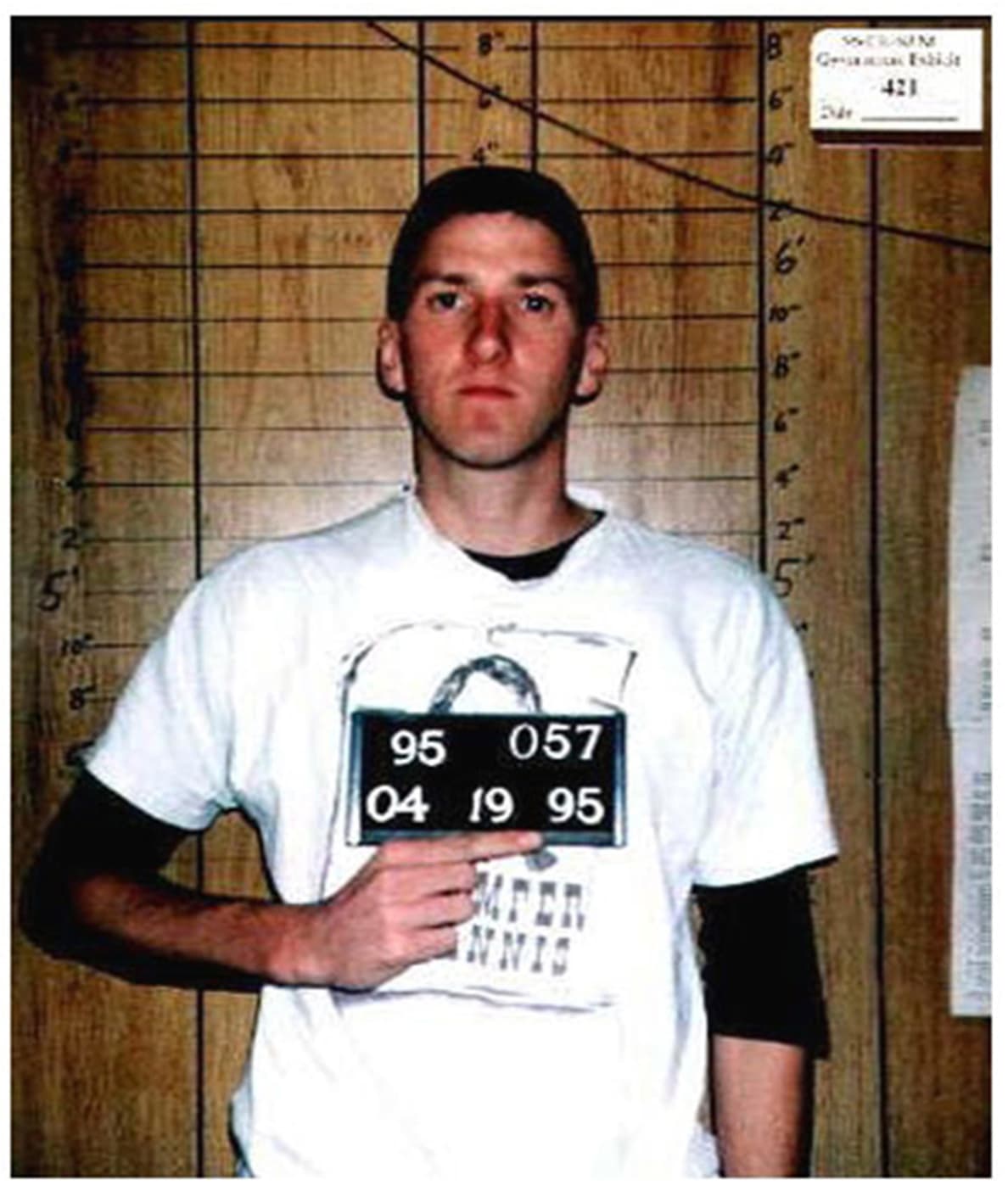
Oklahoma City bomber Timothy McVeigh
Donaldson Collection/Getty
Throughout the Trump era, there have been understandable but misguided calls to pass a domestic terrorism law expanding an investigative dragnet around Radical White Terror. Every law needed to combat Radical White Terror already exists. Further empowering law enforcement is more likely to give the FBI, Department of Homeland Security, and local police tools to target people who meant to donate money to legitimate right-wing causes and religious charities—after which, in keeping with historical practice, they will have an expanded domestic ambit to target nonwhite and left-wing groups, causes and enterprises. The very police entities that would be empowered tend to make common cause with those they ostensibly target.
The calls are already starting. The Wall Street Journal reported shortly after the riot that President-elect Joe Biden plans to prioritize passing a domestic terrorism law. Hillary Clinton advocated “immediately” passing “new criminal laws at the state and federal levels that hold white supremacists accountable and tracking the activities of extremists such as those who breached the Capitol.” On The View on Monday, Meghan McCain said she was “not against sending these people to Gitmo.” But the 9/11 era, with all the reactionary forces it unleashed, helped get the U.S. here. It will never be reverse-engineered to get the U.S. out. It can only get the U.S. deeper into a democracy-draining quagmire.
Few know that more intuitively than Omar. The first woman in Congress to wear a hijab, someone who came to Minnesota as a refugee from Somalia, Omar occupies a unique place in the imagination of Radical White Terror. She embodies everything that people who wear Camp Auschwitz sweatshirts consider the imminent end of America: political power in the hands of a left-wing Black Muslim woman. Trump, who is not incompetent when it comes to demagoguery, fed on a generation of security politics, regnant in both parties, that expressly demonized people who look and worship like Omar. A rhetorical fixture at his rallies, his supporters would chant send her back. Omar’s career shows the promise of American democracy despite such entrenched forces. But it also shows how a War on Terror is reactionary wildfire. Imagine for a moment what the mob would have done if the men who entered the Capitol brandishing zip ties had gotten ahold of her.
And Rep. Omar, with the weight of all of that on her shoulders, is warning against a domestic War on Terror.
“We should not lose sight of our disgust at the double standards employed against white protesters and Black ones, or against Muslims and non-Muslims,” Omar told The Daily Beast. “But at the same time, we must resist the very human desire for revenge—to simply see the tools that have oppressed Black and Brown people expanded.”
Those tools, the fruits of the 9/11 era, allowed the Pentagon to spy on antiwar activists; permitted the Department of Homeland Security to use drone surveillance on Black Lives Matter protesters; facilitated the FBI mapping entire American Muslim communities without suspicion of wrongdoing. The 20-year list is practically endless.
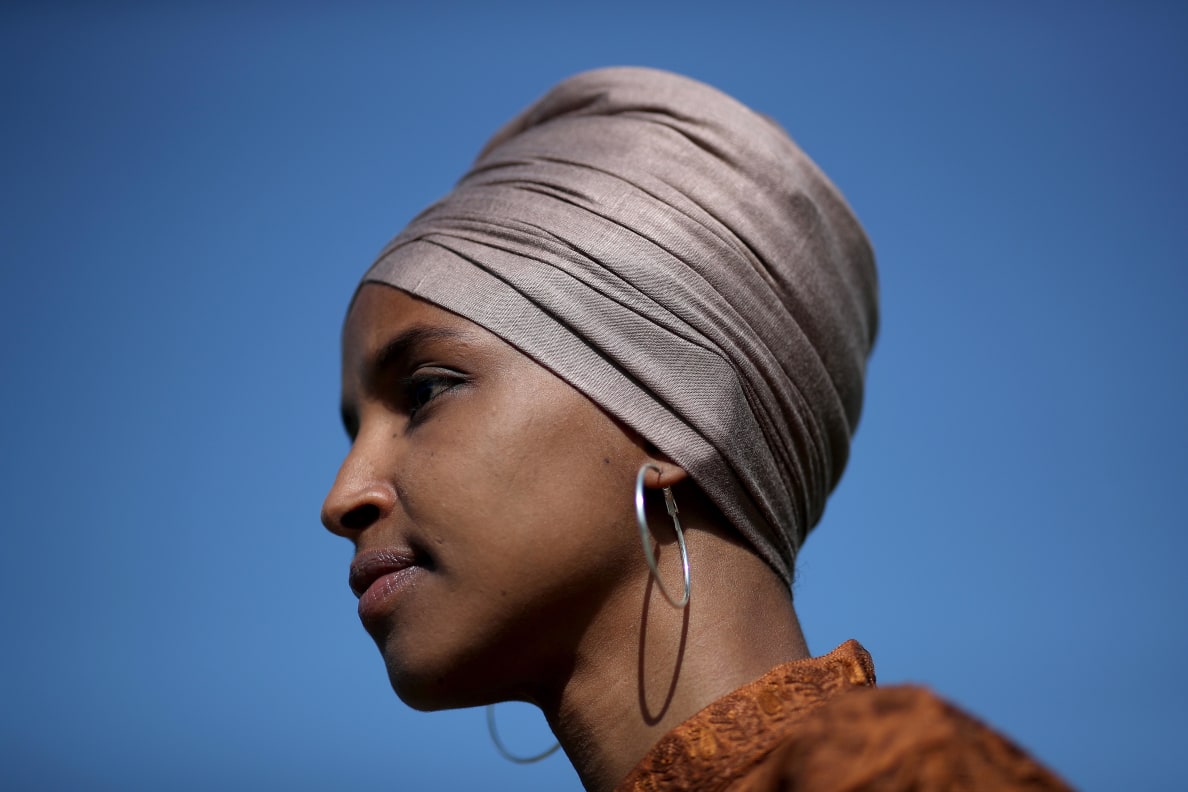
Rep. Ilhan Omar (D-MN)
Win McNamee/Getty
Ever since the slaughter at Pittsburgh’s Tree of Life synagogue in 2018, the bloodiest anti-Semitic attack in American history, a coterie of law enforcement experts have pushed back against calls for new domestic terror authorities, not from conservatives but from liberals. Attorneys like Faiza Patel, the co-director of the Brennan Center for Justice’s Liberty and National Security Program, have argued that such laws are not only unnecessary but could, as a Brennan Center report put it, “be further abused to target protesters and political dissidents instead of terrorists.”
“There are more than 50 laws that Congress has passed that apply to domestic terrorists. In addition, garden variety criminal laws can be used to charge people like the rioters at the Capitol,” Patel explained. “There is no lack of authority. What we have seen so far is a lack of will.”
From Pittsburgh to El Paso to Charlottesville, Radical White Terror has skyrocketed since Trump took office. As a proxy measure for this increase, the TRAC database at Syracuse University, which analyzes a variety of federal statistics, found this week that fiscal 2020 was the highwater mark for domestic terrorism prosecutions. The 183 prosecutions that took place were the highest total in 25 years, and more than double the 69 domestic terror prosecutions that occurred during Trump’s first year in office. Yet despite the rise in prosecutions, the Brennan Center and legislators like Rep. Bennie Thompson (D-MS), who chairs the House Homeland Security Committee, have for years warned the FBI that its actions lag woefully behind the rise in violence. As recently as October 2019, FBI Director Christopher Wray was calling homegrown jihadis “the greatest, most immediate terrorism threat to the homeland.” Michael German, a former FBI special agent, laments that under the FBI’s current leadership, “today the FBI can tell you how many bank robberies there were last year but not how many people white supremacists tried to kill.”
Similarly, “domestic terrorism” is a term that conceals more than it reveals. The euphemism points to the depth of the political challenge Radical White Terror poses.
The FBI does not talk in terms of terrorism committed by white people. Attempting to appear politically ecumenical, a recent bureaucratic overhaul during an accelerated period of domestic terrorism created the category of “racially motivated violent extremism.” The convoluted construct gave the appearance of a false equivalency between the volume of terrorism committed by whites and by nonwhites, prompting Rep. Thompson to tell The Daily Beast in October that it’s “the glossing-over of a problem.”
While Wray’s former colleagues in the administration consider him attentive to the particular danger of white supremacist terrorism, the FBI, as The Daily Beast first reported, is now more than six months negligent in producing a legally required report detailing the particular dangers of white supremacist and other domestic terrorism. For all its hesitation over white terror, the FBI until at least 2018 maintained an investigative category about a nebulous and exponentially less deadly thing it called “Black Identity Extremism.”
All this is in keeping with the history of the FBI. In 1964, Lyndon Johnson ordered FBI Director J. Edgar Hoover to destroy the Third Ku Klux Klan. The recalcitrant Hoover, as devoted a white supremacist as ever wielded an American security agency, was more preoccupied with “the agitators of the Negro movement.” As Tim Weiner recounts in his FBI history Enemies, Johnson told Hoover “to go after the Klan in language he understood,” instructing, “I want you to have the same kind of intelligence that you have on the communists.”
Thus was born an infiltration operation called WHITE HATE. At this point in history, the FBI was functionally lawless, so there was no need to expand the FBI’s powers, only its focus. But WHITE HATE was not the full name of the operation. It was known as COINTELPRO-WHITE HATE. “It involved all the techniques developed in the FBI’s long-running attack on the Left,” Weiner writes. Informants, bribes, break-ins and wiretaps proved so successful that an agent told Weiner, “There would be a Klan meeting with ten people there, and six of them would be reporting back the next day.” It produced sufficient arrests that a year later, Johnson told Hoover, one of the premier enemies of the Constitution in the 20th century, “I sure am proud of what you’ve done on this civil rights thing, and I think history will so show it.”
WHITE HATE was hardly the first COINTELPRO operation—that came in 1956, against the Communist Party U.S.A. It was also COINTELPRO’s exception, not its rule. For all the FBI’s work against the Klan, all Hoover did was devote a small aspect of his repressive apparatus to appease Johnson.
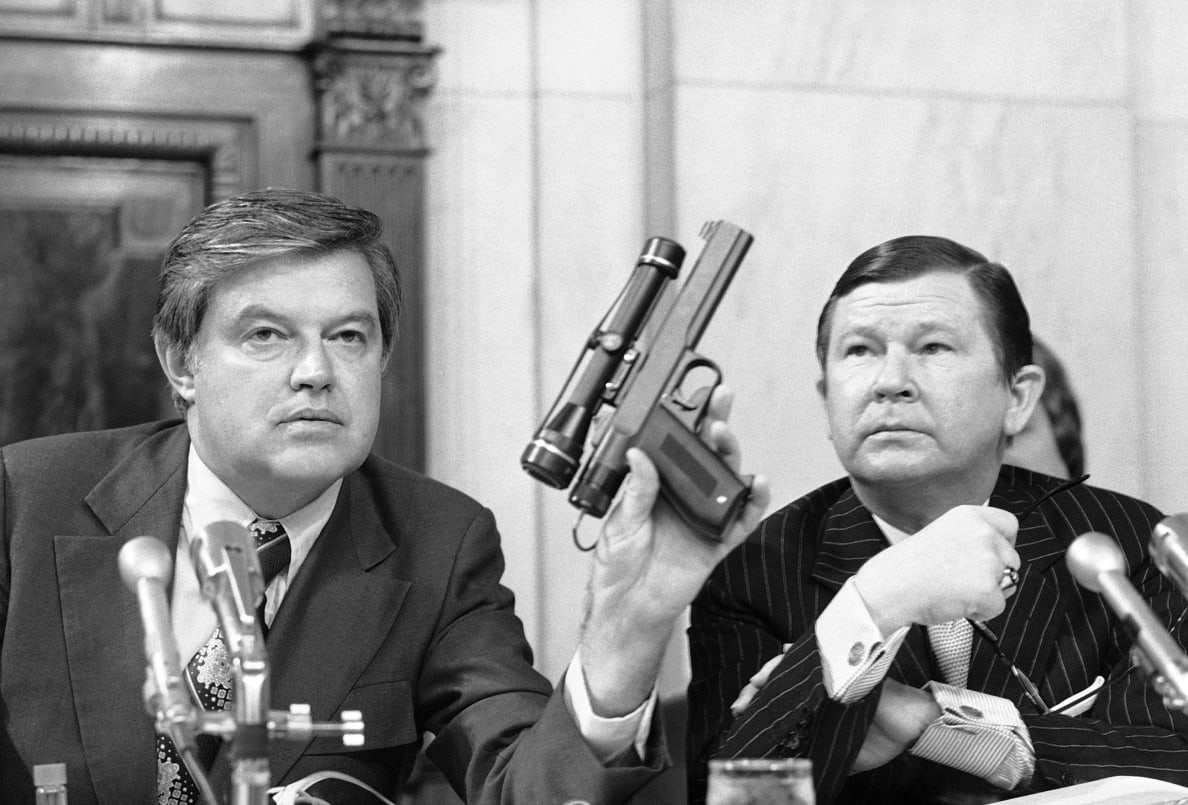
Chairman Frank Church, D-ID, holds up a poison dart gun as co-chairman John G. Tower, R-TX looks at the weapon.
Henry Griffin/AP
Even as WHITE HATE unfolded, Hoover’s intelligence chief, Bill Sullivan, ran a COINTELPRO operation against Martin Luther King Jr. Sullivan developed the infamous sexual blackmail campaign that urged King to take “the one way out for you”—suicide—before “your filthy, abnormal fraudulent self is bared to the nation.” COINTELPRO more typically targeted movements for nonwhite liberation and their “communist” allies; by 1968, 41 of the FBI’s 56 field offices had COINTELPRO operations against the Black Panthers underway. An FBI memo from March 1968 outlined an objective of dividing Black organizations, preventing the emergence of what it called a “messiah” who could “unify and electrify” the movement and to deny such movements “respectability.”
The Church Commission of the 1970s, which exposed decades of abuses of the security state during the Cold War, explained the difference between WHITE HATE and the rest of COINTELPRO. WHITE HATE “was very precisely targeted; each of the other programs spread to a number of groups which do not appear to fall within any clear parameters," it found. WHITE HATE “used comparatively few techniques which carried a risk of serious physical, emotional, or economic damage to the targets,” whereas the operations against Black organizations “used such techniques extensively.” In a judgment that anticipated the War on Terror by 25 years, the commission observed: “Like the progression in targeting, the use of dangerous, degrading, or blatantly unconstitutional techniques also appears to have become less restrained with each subsequent program.”
That sounds like a prologue for what a post-January 6 domestic War on Terror would be. Many of the very people who expanded domestic terror authorities would empower were complicit in the insurrection. So far, up to 15 Capitol Police officers are under investigation for apparent complicity in the riot, with two suspended, CNN reported. DHS, that creation of the post-September 11 War on Terror, is leaderless after the Monday night departure of an acting secretary who a federal judge ruled was in his job illegally, and looks AWOL. Like the Justice Department, which was in a reactive posture on Jan. 6, DHS’ passivity regarding the insurrection stands in unignorable contrast to its summertime enthusiasm for detaining, interrogating, brutalizing, and even shooting Black and left-wing demonstrators. An apparently chastened FBI is currently arresting participants in the insurrection—as it faces difficult questions about why a senior bureau leader inaccurately said on Friday there was no advance warning on the violence—some of whom were off-duty police, servicemembers and veterans. Even the Secret Service is investigating an officer who cheered on the insurrection, falsely asserting that antifa was behind the violence.
The FBI “needs to publicly acknowledge that white supremacy and far-right militancy is a problem in law enforcement and adopt a national strategy to root it out,” said retired FBI special agent German. “Identifying these officers and terminating them, or at least putting them on Brady lists would protect the public and give defendants a chance to impeach any testimony they give in court.”
German has a particular vantage. In the 1990s, without expanded investigative tools, he actively disrupted and arrested white terror cells. “This isn’t rocket science,” he said. “The FBI needs to prioritize the investigation of white supremacist and far-right violence and focus its counterterrorism resources on addressing it. So first that involves collecting data on the nature and scope of their crimes—not their social media, but their actual criminal activity.”
Arresting insurrectionists is easier than holding accountable the elected Republican figures who amplified the election lies that sparked the insurrection. Sen. Susan Collins, a Maine Republican, was more inclined to initially believe that Iran attacked the Capitol instead of Trump loyalists. Such willful blindness speaks to the timidity with which the Republican Party has treated Trump, all out of the fear of losing office—an appeasement strategy that has now put them in physical jeopardy. Attorney Deepak Gupta and journalist Brian Beutler argue that Congress needs to make use of the 14th Amendment’s provisions against insurrection to bar the instigators of the violence from holding office.
Doing so is a step down the road to political deradicalization—the objective that increasing the powers of the security state is predicated upon but cannot accomplish. Yasmine Taeb, a senior fellow with the Center for International Policy, said that over the past several days she is starting to see “the political will” arise amongst Capitol Hill progressives to “do everything they possibly can to hold those accountable, including elected officials, who incited violence.” Taeb, who is in touch with the Biden-Harris transition, added that “the Biden team is aware of the concerns that communities of color and the civil and human rights community has about the proposed legislation.”
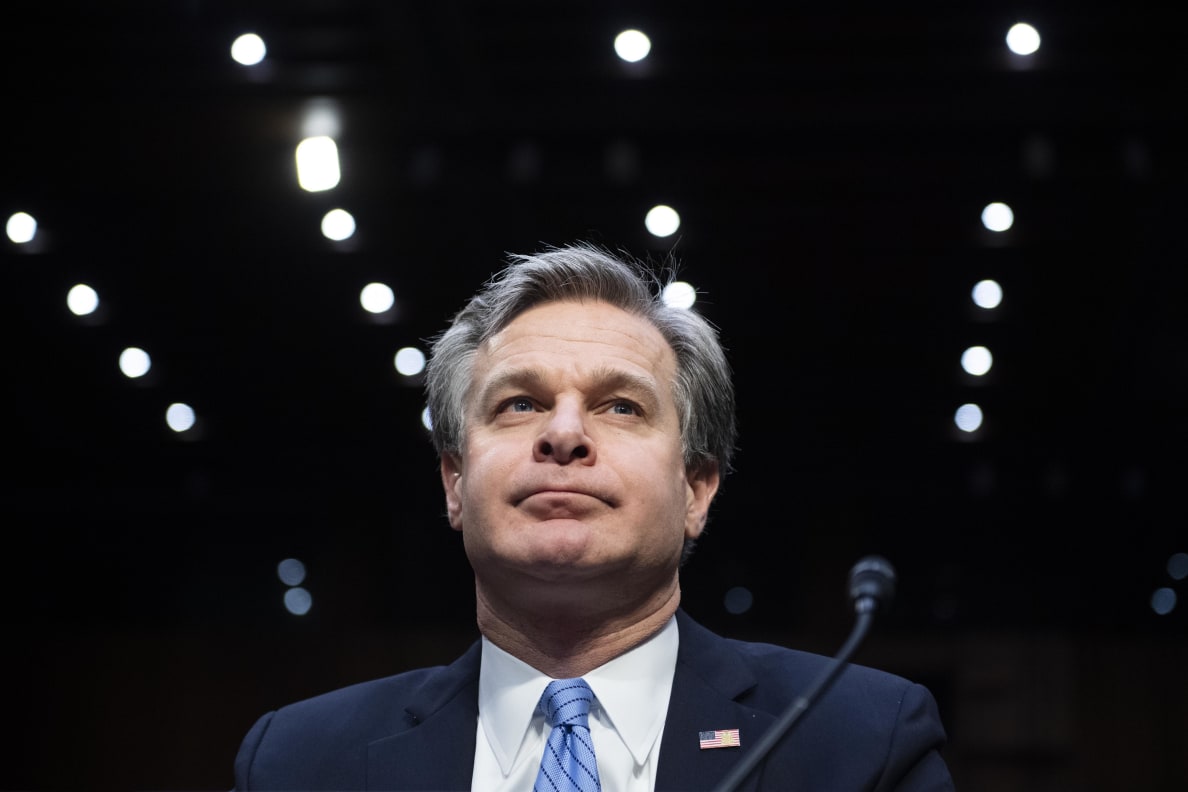
FBI Director Christopher Wray
Tom Williams/Getty
“Giving federal agencies more power to spy on Americans and bigger budgets didn’t stop this attack, because the agencies decided right-wing violence wasn’t a real threat. Until there is an honest reckoning with how politicians and some in law-enforcement are willing to tolerate and even stoke far-right anger, violent criminals will continue to believe they can act with impunity,” Sen. Ron Wyden (D-OR), told The Daily Beast. “That’s why I called on Senators Cruz and Hawley to resign, and for Trump to be removed as soon as possible. Accountability has to start at the top.”
Reports are already circulating that further violence is in the planning stages. Biden’s inauguration will occur amidst a phalanx of National Guardsmen. A new wave of attacks is likely to intensify pressures on Democratic politicians for new domestic terrorism authorities. And amidst all this, a Black Muslim congresswoman is attempting to save American democracy, including the freedom of people who want her deported, or worse.
“We must respect everyone’s rights. We must respect everyone’s essential dignity. This is when we need restorative justice, more than ever,” said Rep. Omar. “The answer is not more laws expanding the surveillance and security state. We already have laws to go after violent and dangerous actors. Instead, we must stay rooted in our love of justice and of human rights and of civil liberties as we respond.”
